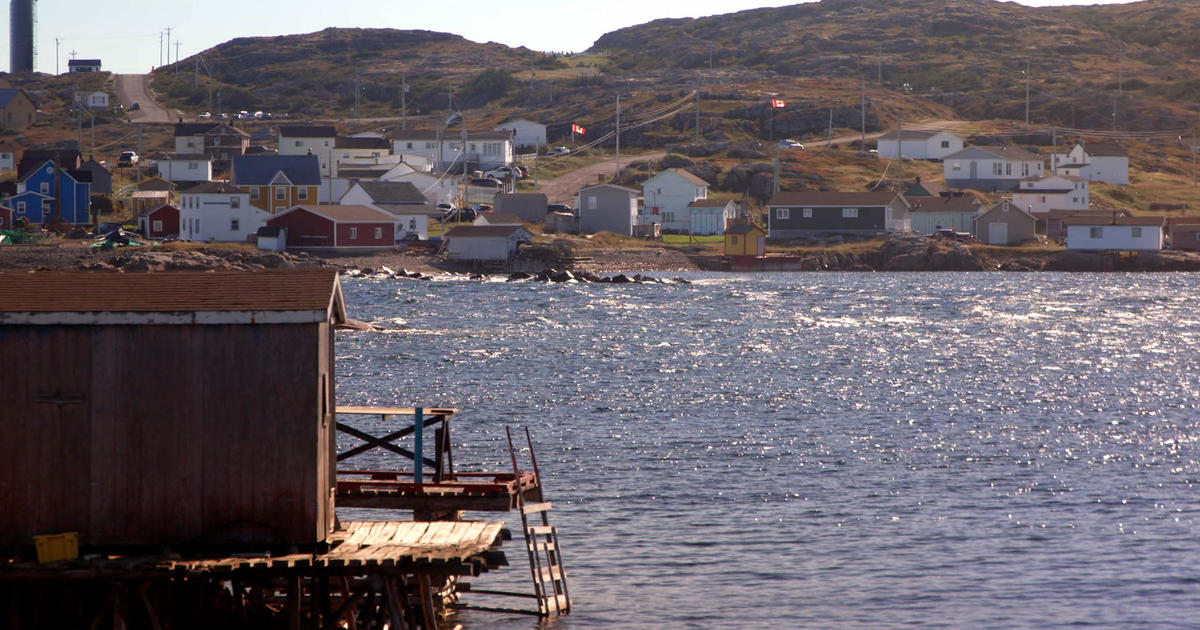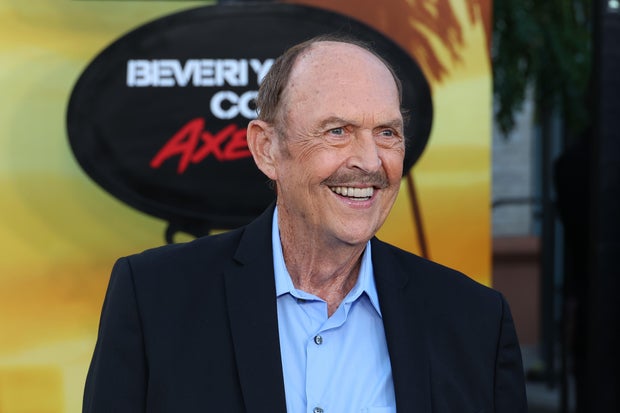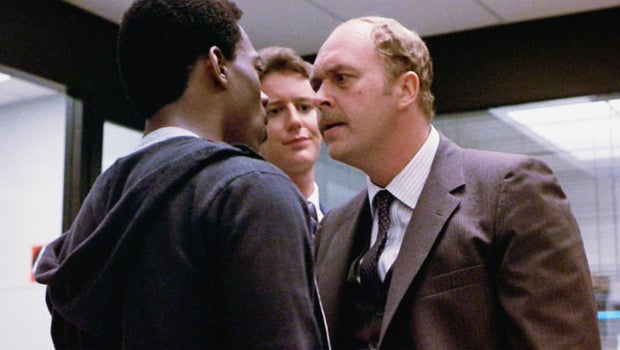CBS News
Fogo Island: Bringing new life to a remote Canadian fishing community

This is an updated version of a story first published on Dec. 12, 2021. The original video can be viewed here.
A remote jewel of land off the coast of Canada, Fogo Island floats in the northeast corner of the northeast province of Newfoundland and Labrador, the outstretched right fingertip of this continent. The place might be drop-dead gorgeous; but it wasn’t immune to the fate befalling so many small and isolated communities in North America: its one and only industry went into steep decline, and so in turn, did its population…. Then in the early 2000s, a local returned home, fresh off making a fortune in the tech sector. Her pockets were deep. So was her desire to lift up the place and bring people back. So she unleashed a sort of economic experiment. As we first told you in 2021, we took two planes, and a long drive and a ferry to reach Fogo Island, and check on the results.
The saying here goes: you’ll know the Newfoundlanders in heaven; they’ll be the ones who want to go home. And the adage comes to life on Fogo Island, a 90-square-mile patchwork of 10 miniscule fishing villages where clapboard houses the color of jelly beans cling to rock 400 million years old. Among its quirks, Newfoundland has its own time zone, half an hour ahead of the mainland. But wander through Fogo Island’s villages and you might as well set your watch back to the 18th century.
Back then all you needed to get by here was a pig, a potato patch and something called a punt— a small, wooden fishing boat used in pursuit of North Atlantic cod, the species that once kept this place afloat.
Seemingly every structure on the island was built in service of catching and preserving fish. With one gleaming exception. A $40 million, luxury inn. Part edge-of-the-earth destination, part economic-engine-on-stilts, the inn is the brainchild of eighth generation Fogo Islander Zita Cobb. And locals gave her a funny look when she first floated the idea.
Jon Wertheim: What kinda reaction did that get?
Zita Cobb: “Why would anyone come here?” We love this place, but it wasn’t obvious when, you know, there are fancy places in the world that people go. Our assumption is everybody wants to go where it’s warm. (LAUGH)
Jon Wertheim: Someone suggested to us it looked like– a ship.
Zita Cobb: The architecture of the inn was– obviously a topic of much conversation. I think about it as a metaphor. It’s about people from here and people from away. It’s about the future and the past.
The past looms large on Fogo Island. To fully appreciate the inn, even as a metaphor, you have to understand Fogo’s history.
Jon Wertheim: It’s just something.
Zita Cobb took us through dozens of tiny islands that dot Fogo’s waters to a place called Little Fogo Island – and for those keeping track, that’s an island, off an island, off an island. Her ancestors landed here from Ireland and South England. They came for one reason.
Zita Cobb: Fish, fish, and fish.
Jon Wertheim: When you say fish, is it just a given?
Zita Cobb: It’s a given. So when, yes. When we– say fish, we mean cod.
Jon Wertheim: Is it possible to exaggerate the importance of cod to this place?
Zita Cobb: No. It’s not possible, because everything that you need to know about someone from here you can figure it out by just studying that lowly fish. It’s actually quite a noble fish.
Jon Wertheim: A noble fish?
Zita Cobb: It asks very little and gives so much. They exist on almost anything. I mean I think a cod could eat a rubber boot if it had to.
Not unlike the noble fish, Zita Cobb’s family survived without fuss.
In cod they trusted. Families worked side-by-side here, trading their fish for goods. No bank accounts, no cash. Cobb’s parents could neither read nor write. She and her six brothers grew up in a house with no electricity. She says it was a happy childhood. Until it wasn’t.
Jon Wertheim: What happened?
Zita Cobb: The worst of the 20th century came down on top of us very quickly in the form of the industrialization of the fisheries. So these enormous factory ships showed up here – all along the coast of Newfoundland. And fished day and night until just about every last fish was gone.
With one small punt launched from this one dock, Cobb’s father couldn’t compete with commercial vessels that had come to the North Atlantic from all over the world.
Jon Wertheim: How bad did things get for him?
Zita Cobb: Things got– he would go out and come back with nothing. But one day in particular he came back with one fish. And he brought the fish into the house, and he slapped it down onto the kitchen floor, and said, “Well, it’s done.” And it was the next day he burned his boat.
Jon Wertheim: He burned his boat?
Zita Cobb: He burned his boat.
Jon Wertheim: It’s almost like a sacrifice.
Zita Cobb: It was. He did it as a statement. He did it as an expression of pain and anger.
Lambert Cobb made this sacrifice once he realized that those big boats were – in his words – turning fish into money.
Zita Cobb: He said to me, as a ten-year-old, “You have got to figure out how this money thing works.” “‘Cause if you don’t, it’s gonna eat everything we love.”
He wasn’t wrong. As fish stocks dwindled, so did the island’s population – from 5,000 to 2,500. The Cobbs left, grudgingly, for the mainland in the 1970s. Zita Cobb’s father died shortly thereafter; but she heeded his advice. She got a business degree, worked in fiber optics, landed in Silicon Valley, and before long, was the third-highest paid female executive in America. In her early 40s, she cashed out tens of millions in stock options, dropped out of the winner-take-all economy and took her business savvy home, determined to revitalize Fogo Island. Instead of writing a check, she posed a question.
Zita Cobb: What do we have and what do we know? And how can we put that forward in a way that’s dignified for Fogo Islanders, and creates economy, and connects us to the world?
Spend one night at what the locals call a shed party and the answer emerges.
Zita Cobb: When you think about the people of this place, if there’s one thing we’re really good at, it’s hospitality.
Jon Wertheim: What does hospitality mean here?
Zita Cobb: Hospitality in its purest form is the love of a stranger. We didn’t get a lot of strangers and when they arrived, as my mother used to say, it’s always better to see a light coming into the harbor than a light going out.
So in 2013, Cobb built the biggest beacon in the harbor. She made the Fogo Island Inn the centerpiece of a charitable trust—called Shorefast—with profits reinvested in the island. At $2,000 a night, the Inn does turn a profit. But there were other considerations.
Zita Cobb: We’re gonna put a 29 room inn on an island that’s never had an inn. What are the consequences of that? Well, more people will come? Well, how many more people? As one woman said “Well, you know, we’re only 2,500 people. We can only love so many people at a time.”
Shorefast and the inn employ more than 300 Islanders. But the real payoff is the ripple effect.
For starters, all the furniture at the inn is locally made.
Same for the pillows and quilts. It so happens the women of Fogo Island have been making them for their own homes for 400 years.
Lillian Dwyer: We’re getting there. We got half done.
Word is out now. This quilt is destined for a customer in Baltimore. We joined the quilting bee.
Lillian Dwyer: Watch him, Millicent.
But didn’t last long.
Jon Wertheim: It was all very nice except for this one square.
Dwight Budden: This is our lettuce room…
Shorefast puts up seed money for new businesses, too – a quarter of a million dollars so far.
Hayward Budden: And then you put your plant in.
A $7,500 microloan went to Dwight Budden and his father Hayward, a former fisher who left Fogo Island when the industry collapsed. He’s back now, as a hydroponic farmer, growing greens for the inn.
Dwight Budden: Yeah, there’s our kale.
Jon Wertheim: Does Hayward eat kale?
Hayward Budden: Not too much. (LAUGHTER)
Beyond the kale, new culture is taking root. Futuristic-looking studios now speckle the landscape – part of Shorefast’s ambition to bring artists-in-residence to Fogo. And back at the inn, a chef turns cod into haute cuisine.
Jon Wertheim: If your dad saw cod with magnolia oil and sea foam–
Zita Cobb: And porcini.
Jon Wertheim: And porcini–
Zita Cobb: Cini– yes. (LAUGH)
Jon Wertheim: What would he say?
Zita Cobb: Yes. First thing, he’d say, “Can you really eat that?”
You can do more than eat cod; you can fish for it again. Now that a decades-long ban has been eased, Fogo Island’s fishers are back hauling cod. We ventured out of Fogo Harbor with brothers Glen and Jerry Best – the fifth generation of their family to harvest these waters.
Glen Best: You go East, your next stop is Ireland.
Jon Wertheim: Ireland?
Glen Best: We’re not going there today. (LAUGH)
The Best brothers showed us the traditional Newfoundland way of fishing with a handline, 150 feet down, no rods, reels or nets.
Jon Wertheim: Now we’re talkin’
Glen Best: That’s a beauty.
Up comes cod, without much of a fight.
Glen Best: Now that’s a nice cod. That’s probably a 20-pound fish.
Cod is making a comeback in the North Atlantic. Canada still imposes catch limits, but when the Bests get down to business, they use an automated system to drop thousands of hooks in the water at a time. We watched them offload 20,000 pounds of cod from a single trip.
What’s more, shellfish has done the unthinkable, and dethroned cod as king. Crab and shrimp now make up eighty percent of Glen Best’s business; and he’s never had a better year.
Jon Wertheim: You told me you caught 400,000 pounds of snow crab. At $7.60 a pound.
Glen Best: Yeah it’s pretty good.
Jon Wertheim: 3 million bucks.
Glen Best: It adds up.
Jon Wertheim: That’s pretty good…
Glen Best: Yeah it was a good year.
But a thriving fishery isn’t always enough to keep the kids around. Best’s three children have moved away from Fogo to pursue other careers.
Jon Wertheim: Your family’s been doing this for generations. You named this boat after your dad.
Glen Best: So the sad part about it is that Jerry and myself we probably could be the last generation that will fish within our family. When the day comes, that that happens, that will probably be a sad day.
Still, Fogo Island’s population has stabilized. There’s hope the next census will show an uptick. Babies are the island’s biggest celebrities. But as ever, with growth come growing pains.
It’s already become one of those islands where you have to pray to get a spot on the ferry.
Jennifer Sexton spent summers on Fogo Island visiting her grandparents. She recently moved here from Western Canada to open this coffee joint, where locals mix with those who come from away.
Jennifer Sexton: Everybody asks about the Inn.
Jon Wertheim: What do you tell them?
Jennifer Sexton: Well, it’s a blessing and a curse.
Her regulars grumble that not long ago, they could get a home for $25,000 thousand —Canadian. Now homes cost ten times as much.
Jennifer Sexton: For somebody from away, that wouldn’t be a lot. But for somebody from here, that is a lot of money.
Zita Cobb, the woman who turned this tide, says she doesn’t want unchecked growth either.
Zita Cobb: As the economy grows, we will be smaller as a percentage of the whole economy.
Jon Wertheim: A rare business leader that wants less market share. (LAUGH)
Zita Cobb: We want less market share. Exactly.
Jon Wertheim: You say that with a smile on your face but there’s a lotta responsibility here.
Zita Cobb: Yeah. I mean the consequences are huge, because– as my brother says, yes, our– our parents will get out of the graveyard and wring our necks if we– if we mess this up.
Jon Wertheim: What’s your response to the– the capitalist who would say, why are you limiting your growth?
Zita Cobb: That is the techno-economic question. But I start with a different question. What are we optimizing for? We are optimizing for place. We’re optimizing for community.
The pillars of this community have been won over. If Cobb’s experiment helps diversify the economy, Glen Best says he’s all-in.
Glen Best: It’s not like we’re overrun by tourism. That’s not the way it works here. We’re not, you know, we’re not the Venice of– Newfoundland, you know? We’re not out of patience with people yet.
On our last night, at the shed party, we got the full sweep of Fogo Island, its hospitality and its contrasts laid out on the table, cod and crab, young and old, warmth, wit. And a traditional song delivered with a handshake, a kind of hope that comes tempered by history.
Zita Cobb: The undoing of this traditional way of making a life was very painful. I think I still carry those broken hearts. I think that– kinda pain doesn’t go away.
Jon Wertheim: To what extent has that been repaired by the work you’ve done since you’ve come back?
Zita Cobb: Yeah, I think it actually does help. You can heal a broken heart.
Produced by Nathalie Sommer and Kaylee Tully. Broadcast associate, Elizabeth Germino. Edited by Peter M. Berman.
CBS News
Residents in Georgia ordered to evacuate or shelter in place after fire at chemical plant

Some residents east of Atlanta were evacuated while others were told to shelter in place to avoid contact with a chemical plume after a fire at a chemical plant.
Rockdale County Fire Chief Marian McDaniel told reporters that a sprinkler head malfunctioned around 5 a.m. Sunday at the BioLab plant in Conyers. That caused water to mix with a water-reactive chemical, which produced a plume of chemicals. The chief said she wasn’t sure what chemicals were included.
A small roof fire was initially contained, but reignited Sunday afternoon, Sheriff Eric Levett said in a video posted on Facebook as gray smoke billowed into the sky behind him. He said authorities were trying to get the fire under control and urged people to stay away from the area.
People in the northern part of Rockdale County were ordered to evacuate and others were told to shelter in place with windows and doors closed. Sheriff’s office spokesperson Christine Nesbitt did not know the number of people evacuated.
The federal Environmental Protection Agency and the Georgia Environmental Protection Division were both on site, county Emergency Management Director Sharon Webb said. The agencies are monitoring the air “to give us more of an idea of what the plume consists of.”
McDaniel said crews were working on removing the chemical from the building, away from the water source. Once the product is contained, the situation will be assessed and officials will let residents know whether it is safe to return to their homes, she said.
An evacuation center was opened at Wolverine Gym in Covington.
CBS News
How Walz and Vance are preparing for the 2024 VP debate

Washington — Sen. JD Vance and Minnesota Gov. Tim Walz will face off on Tuesday in the first and only vice presidential debate of the cycle, as the two candidates look to prop up the Republican and Democratic tickets with fewer than 40 days until Election Day.
The debate, hosted by CBS News at the CBS Broadcast Center in New York City, will be moderated by “CBS Evening News” anchor and managing editor Norah O’Donnell and “Face the Nation” moderator and CBS News chief foreign affairs correspondent Margaret Brennan.
Here’s what to know about how the candidates are preparing for the debate:
How JD Vance is preparing for the VP debate
The Ohio Republican has been preparing for the debate for more than a month, a source directly involved told CBS News, including with “murder board” sessions with a small team that includes Vance’s wife and his advisers, along with senior Trump adviser Jason Miller.
Among Vance’s main focuses during the preparation has been studying Walz’ debate style and policy record, the source said, noting that Vance will attempt to highlight what he sees as the Minnesota governor’s left-wing views during the debate.
Vance told reporters last week that his plan is to break down what the Trump-Vance administration would do to make “life better” and connect that to policy.
“So, we’re studying up as much as we can on the issues that matter to the American people, and I’m looking forward to it,” Vance said.
House Majority Whip Tom Emmer, a Minnesota Republican, is standing in for Walz during Vance’s debate prep, four sources familiar with the preparations told CBS News. Emmer and Walz have deep roots in Minnesota and are close in age.
Emmer told ABC’s “This Week” on Sunday that he’s known Walz for decades and has spent the last month working to “get his phrases down, his mannerisms.”
“My job was to be able to play Tim Walz so JD Vance knows what he’s going to see,” Emmer said.
Getty Images
How Tim Walz is preparing for the VP debate
Walz has been preparing for the debate with a close team of advisers, a source familiar with the preparations told CBS News. Some of the people involved also helped Vice President Kamala Harris take on former President Donald Trump, among others, like a long-time aid to Walz who worked with him during his bids for governor.
For Walz, whose name recognition was until recently limited outside of Minnesota, the focus is on continuing to introduce himself to the American people, according to the source. He’ll also work to highlight Harris’ vision for the nation’s path forward.
“You’ll hear me talk like I have about things that impact Americans, making sure they have the opportunity to thrive, making sure that we’re being factual in how we talk about that,” Walz told MSNBC’s Rachel Maddow of the debate earlier this month. “And so I’m looking forward to it. I’ll work hard, that’s what I do.”
During debate prep, Transportation Secretary Pete Buttigieg is standing in for Vance, a campaign official familiar with the preparation told CBS News. The former mayor of South Bend, Indiana, also assisted Harris during her debate prep in 2020, and is close in age to Vance.
When and how to watch the presidential debate
Debate coverage on CBS News 24/7 begins at 4 p.m. ET, with the debate getting underway at 9 p.m. ET on Oct. 1.
The 90-minute debate will be streamed on CBS News 24/7 and Paramount+ across all available platforms and CBSNews.com. The debate will also be simulcast across other broadcast and cable networks.
,
,
and
contributed to this report.
CBS News
John Ashton, “Beverly Hills Cop” franchise actor, dies at 76

Actor John Ashton, best known for his role as the by-the-book detective in the “Beverly Hills Cop” franchise, has died, his publicist Alan Somers confirmed to CBS News on Sunday. He was 79.
Ashton died Thursday in Ft. Collins, Colorado, after a battle with cancer.
“John was a loving husband, brother, father, and grandfather who will be deeply missed by all who knew him,” a statement said.
Leon Bennett/Getty Images
Ashton was born in Springfield, Massachusetts on Feb. 22, 1948, and raised in Enfield, Connecticut. He received a Bachelor of Arts from the University of Southern California.
Throughout his 50-year career in show business, Ashton appeared in nearly 100 movies after making his debut in 1973’s “The Psychopath.”
He was probably best known for his role as Det. Sgt. John Taggart in the first two installments of the “Beverly Hills Cop” series alongside Eddie Murphy and Judge Reinhold. He reprised his role in 2024’s “Beverly Hills Cop: Axel F.”
Paramount Pictures via Getty
Other film credits include “Some Kind of Wonderful,” “She’s Having a Baby,” “Midnight Run,” “Little Big League” and “Gone Baby Gone.”
On television, he played Willie Joe Garr on several episodes of “Dallas” and made an appearance on such shows like “Columbo,” “Police Squad!” “Hardball” and others.
“John devoted his career to honing his craft and bringing characters to life on the screen. His presence will be greatly missed,” Somers said.
Ashton is survived by his wife Robin Hoye, three children, three step-children and a grandson. He also leaves behind two sisters and a brother.
“John leaves behind a legacy of love, dedication, and service. His memory will forever be treasured by his wife, children, grandchildren, as well as his brother, sisters, his extended family and all who loved him,” Somers said. “John’s impact on the world will be remembered and celebrated for generations to come.”
The family requests any donations in Ashton’s memory be made to Pathways Hospice Care









